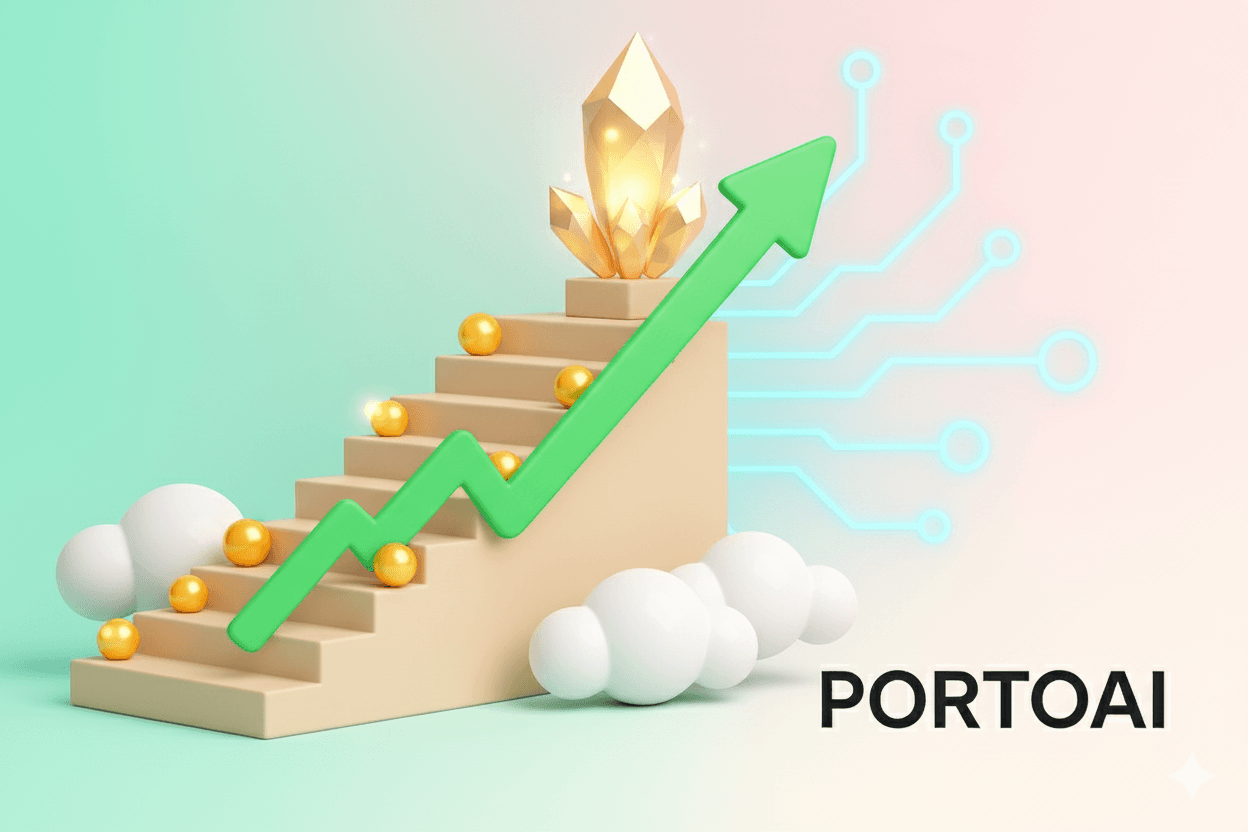What Should Investors Do During Market Declines? Strategies for Resilience

Venkateshwar Jambula
Lead Market Researcher
5 min read
•Published on September 14, 2024
•Navigating Market Declines: Strategies for Investor Resilience
Market downturns are an inevitable part of the investment cycle. While headlines may scream uncertainty, a disciplined and informed approach can transform these periods from sources of anxiety into opportunities for strategic growth. At PortoAI, we empower sophisticated investors to maintain clarity and execute with precision, even when markets become volatile.
This guide outlines critical actions investors should consider during market declines, focusing on data-driven insights and long-term strategic positioning. We will explore how to fortify your portfolio, identify opportunities, and maintain a steadfast focus on your financial objectives.
Key Actions During Market Declines
1. Conduct a Thorough Portfolio Review
When markets decline, a deep understanding of your holdings is paramount. This involves more than a cursory glance; it requires a fundamental analysis of each asset. Examine the underlying business fundamentals, including revenue growth, profitability, debt levels, and competitive positioning. Differentiate between temporary market sentiment and genuine long-term value erosion. PortoAI's Market Lens provides comprehensive data and AI-driven insights to facilitate this in-depth analysis, helping you discern the true quality of your investments.
2. Reinforce Diversification and Risk Management
Diversification remains a cornerstone of prudent investing, especially during periods of market stress. Spreading investments across various asset classes (equities, fixed income, alternatives), industries, and geographies acts as a crucial risk mitigation tool. A well-diversified portfolio can buffer the impact of downturns in specific sectors or markets. Consider how your current allocation aligns with your risk tolerance and long-term goals. PortoAI's risk console offers advanced analytics to help you assess and manage portfolio diversification effectively.
3. Strategically Identify Buying Opportunities
Market declines often present compelling opportunities to acquire high-quality assets at discounted valuations. However, this requires patience and rigorous due diligence. Focus on fundamentally strong companies with durable competitive advantages that have been unfairly punished by broader market sentiment. Avoid impulsive purchases driven by short-term price movements. Instead, leverage data to identify companies poised for long-term recovery and growth. PortoAI's research capabilities can help identify these undervalued gems.
4. Maintain a Long-Term Investment Horizon
It is essential to resist the temptation to make emotional decisions based on short-term market volatility. Historically, markets have demonstrated resilience and a capacity to recover over time. Adhering to your well-defined investment strategy and long-term objectives is critical. Avoid drastic portfolio adjustments that could jeopardize your future financial goals. A clear vision of your long-term objectives, supported by robust data, is key to weathering market storms.
5. Leverage Tax-Loss Harvesting
Periods of market decline can present strategic opportunities for tax optimization. Tax-loss harvesting involves selling investments that have incurred losses to offset capital gains realized elsewhere in your portfolio. This strategy can reduce your overall tax liability and improve after-tax returns. Consult with a tax professional to understand how this applies to your specific jurisdiction and to ensure compliance with all relevant regulations. This sophisticated tax strategy can be a valuable component of a resilient investment plan.
Critical Actions to Avoid During Market Declines
1. Avoid Panic Selling
Emotional decision-making, particularly fear-driven selling, is one of the most detrimental actions an investor can take during a market downturn. Selling assets at depressed prices can lock in losses and cause you to miss out on subsequent market recoveries. Focus on the fundamental value of your investments and your long-term strategy rather than succumbing to market noise.
2. Avoid Impulsive, Undisciplined Buying
While seeking buying opportunities is prudent, making hasty purchases without adequate research is equally perilous. Ensure that any investment decision is grounded in thorough analysis of the company's financial health, competitive landscape, and future prospects. Rely on data and objective analysis, not on speculative trends or immediate price action.
3. Do Not Neglect Your Overall Financial Health
Market downturns can extend beyond investment portfolios to impact broader personal finances. Ensure you have an adequate emergency fund to cover unexpected expenses and maintain financial stability. Review your budget, manage debt responsibly, and secure appropriate insurance coverage. A strong personal financial foundation provides the security needed to withstand market volatility and pursue long-term investment goals.
Summing Up
Navigating market declines requires a blend of discipline, data-driven analysis, and a steadfast commitment to your long-term investment strategy. By conducting thorough portfolio reviews, reinforcing diversification, strategically identifying opportunities, and maintaining a long-term perspective, investors can build resilience. Leveraging tools like PortoAI's Market Lens and risk console empowers you to make informed decisions, while avoiding panic selling and impulsive actions is crucial. Remember, market fluctuations are temporary; prudent, data-informed choices position you for sustained success.
Disclaimer: This content is for educational purposes only and does not constitute investment advice. Always conduct your own due diligence or consult with a qualified financial advisor.
Blog
Investment Insights and Tips
Explore our latest investment strategies and insights.

Stocks
Master Investment Psychology: Control Emotions for Smarter Stock Decisions
The Psychology of Stock Investment: Understanding Emotions That Affect Investment Decisions A stock market is a funny place – both the seller and buye...
Venkateshwar Jambula
November 7, 2024
•4 min read

Stocks
Power Grid India Stock: Analyzing PGCIL's Price Movements & Future
The Rise and Fall: Unraveling the Power Grid Corporation of India Stock Price The Power Grid Corporation of India Stock Price (PGCIL) has experienced ...
Venkateshwar Jambula
November 6, 2024
•10 min read

Stocks
Are Multibagger Stocks Still Possible in 2025? Your AI Guide
These 6 Multibagger Stocks Exploded in 2025 — Is Your Portfolio Still in 2022? Till June 2025, the benchmark Sensex has risen by around 4%, reflecting...
Venkateshwar Jambula
November 5, 2024
•11 min read

Stocks
Top 5 Indian Growth Stocks & Sectors for 2025: AI-Driven Insights
Top 5 Best Growth Stocks in India & Sectors to Watch in 2025 You see the market correction in late 2024 and early 2025 was driven by weak economic...
Venkateshwar Jambula
November 4, 2024
•9 min read